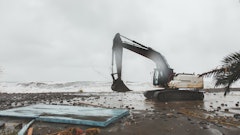
- On June 17, host Rio de Janeiro declared a "state of public calamity"
- Thirty days out, the event is projected to lose $6 billion
- Epic health and safety risks still threaten events, participants, and attendees
- Key projects coming down to the wire, including a $2.3-billion subway
- Construction has resulted in 11 fatalities since 2013
Olympic suspense started well before the contests, focusing on whether or not the facilities and infrastructure of Brazil's Rio de Janeiro, host to the 2016 Games, will be ready for its 17-day global extravaganza. Beginning Aug. 5, the 2017 Olympics are expected to draw 500,000 tourists to Rio and billions of TV viewers.
By most accounts, all should go off as planned, albeit after one of the shakiest launches in Olympic history. As political corruption and economic instability gripped Brazil, the state and the city seemed to lose their collective grip on several key initiatives, including construction of stadiums, housing and infrastructure.
With work on the Rio Olympic Velodrome 88% complete in late May, Rio's own Tecnosolo Engenharia S.A. declared bankruptcy. Latest estimates now indicate the facility will be completed July 25, just 10 days before the games begin.
After several delays, the $2.3-billion, 16-km subway extending from the city's center to the Olympic Park is now scheduled to open officially on August 4, just 24 hours before the Games begin.
Health and safety concerns have continued to grab headlines. Brazil's Zika virus epidemic has caused some athletes to withdraw from the Games and many attendees to stay home. The two bodies of water in which rowers and canoers will compete — Guanabara Bay and Rodrigo de Freitas Lagoon — both are teeming with ‘levels of viruses so high that if we saw them here in the U.S. on beaches, officials would likely close them,” noted Kristina Mena, an expert in waterborne viruses and an associate professor at the University of Texas Health Science Center in Houston.
Two years out from the event, Athens had completed 40% of its needed work and London 60%. By comparison, Rio had just 10% of its work done.



















